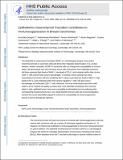Epithelial-to-Mesenchymal Transition Contributes to Immunosuppression in Breast Carcinomas
Author(s)
Rashidian, Mohammad; Bagnato, Aaron; Dongre, Anushka; Reinhardt, Ferenc; Keckesova, Zuzana; Ploegh, Hidde; Weinberg, Robert A; ... Show more Show less
Downloadnihms870240.pdf (993.0Kb)
OPEN_ACCESS_POLICY
Open Access Policy
Creative Commons Attribution-Noncommercial-Share Alike
Terms of use
Metadata
Show full item recordAbstract
The epithelial-to-mesenchymal transition (EMT) is a cell biological program that confers mesenchymal traits on carcinoma cells and drives their metastatic dissemination. It is unclear, however, whether the activation of EMT in carcinoma cells can change their susceptibility to immune attack. We demonstrate here that mammary tumor cells arising from more epithelial carcinoma cell lines expressed high levels of MHC-I, low levels of PD-L1, and contained within their stroma CD8þT cells and M1 (antitumor) macrophages. In contrast, tumors arising from more mesenchymal carcinoma cell lines exhibiting EMT markers expressed low levels of MHC-I, high levels of PD-L1, and contained within their stroma regulatory T cells, M2 (protumor) macrophages, and exhausted CD8þT cells. Moreover, the more mesenchymal carcinoma cells within a tumor retained the ability to protect their more epithelial counterparts from immune attack. Finally, epithelial tumors were more susceptible to elimination by immunotherapy than corresponding mesenchymal tumors. Our results identify immune cells and immunomodulatory markers that can be potentially targeted to enhance the susceptibility of immunosuppressive tumors to various therapeutic regimens.
Date issued
2017-04Department
Massachusetts Institute of Technology. Department of Biology; Ludwig Center for Molecular Oncology (Massachusetts Institute of Technology)Journal
Cancer Research
Publisher
American Association for Cancer Research (AACR)
Citation
Dongre, Anushka, et al. “Epithelial-to-Mesenchymal Transition Contributes to Immunosuppression in Breast Carcinomas.” Cancer Research 77, 15 (April 2017): 3982–3989 © 2017 American Association for Cancer Research
Version: Author's final manuscript
ISSN
0008-5472
1538-7445